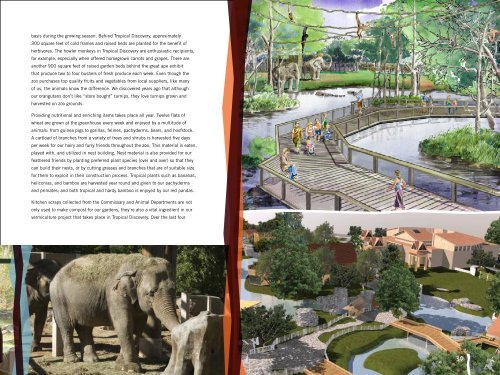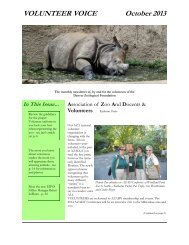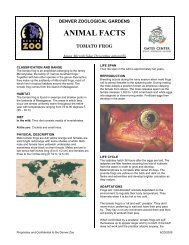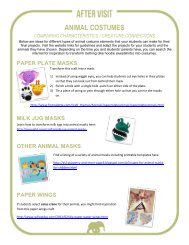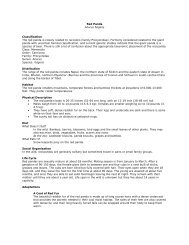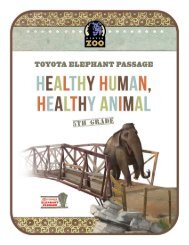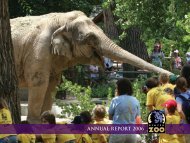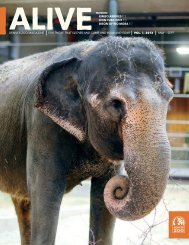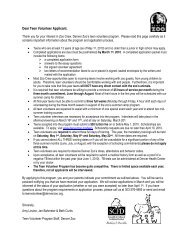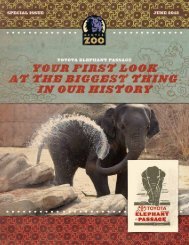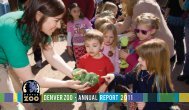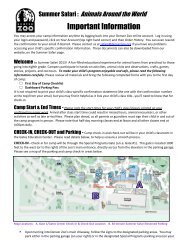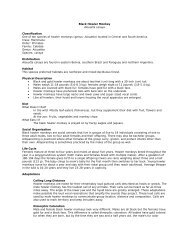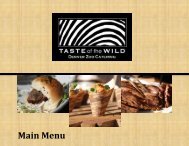elow leftenvironmental teammembers acceptingthe Gold Award fromthe EnvironmentalLeadership Programbelow right elephantskeep <strong>Denver</strong> <strong>Zoo</strong> staffbusy with their diet andtheir new homefar right renderings ofthe elephant house andgibbon habitat as partof the ten-acre AsianTropics developmenthow green can you go? —or are we green yet?Are we still talking green? Sure, green is as much a process as adestination and <strong>2008</strong> saw a lot of both. In <strong>2008</strong>, <strong>Denver</strong> <strong>Zoo</strong>became a Gold Member of the state’s Environmental LeadershipProgram (ELP), and was certified under the InternationalOrganization for Standardization’s (ISO) 14001 program. Bothof these achievements required a significant effort from all zoodepartments and represent a new level of commitment from thezoo’s green team, the Workplace Conservation Committee. It is wellknown that <strong>Denver</strong> <strong>Zoo</strong> has achieved great “green” things for manyyears, most notably in areas of reductions in water use. While these pastbenchmarks are something to be proud of, <strong>2008</strong> represents a watershed in ourgreen effort. To use an often cited metaphor, many of our previous green goalshave been “low hanging fruit.” We have been steadily climbing the tree to besure, and now we are addressing the hard to reach items. In order to be a stateGold Leader and to become ISO 14001 certified, the zoo needed to implementa Sustainable Management System (SMS) that will guide our operations asthey relate to our environmental and social responsibilities. The WorkplaceConservation Committee (WPCC) increased its meeting frequency to every twoweeks, and the members (representatives from every zoo department) got downto the hard work of gathering information and setting our sustainable goals. Thebasis of an SMS is continual improvement, so the WPCC put together ongoingObjectives and Targets based on the day-to-day operations of the zoo, and createda methodology of measuring our performance against these goals. When we fallshort of an objective, there is a way to identify the causes and create a “correctiveaction” to guide future improvement. In October, the zoo became one of 33 GoldMembers in the state’s program and, in December, <strong>Denver</strong> <strong>Zoo</strong> became the firstzoo in the United States to attain ISO 14001 certification for all operations — atruly monumental achievement.horticulture & grounds: behind the scenesThe work of the Horticulture and Grounds Department can be seen throughoutthe zoo, from the native grasses as you approach the entrance to the tropicalenvironments of Bird World and Tropical Discovery. We install and maintainturf, trees, and everything in-between, in exhibits and surrounding landscapes.We clean pathways, dispose of trash and waste, and support recycling effortsthroughout the zoo. We provide our customers a safe and clean environment whileat the same time promoting conservation and educational opportunities throughthoughtful and creative plantings. While these efforts are visible to zoo guests,our work behind the scenes makes zoo horticulture unique. It is why we work atthe zoo even though gardening is much more challenging in an environment withmillions of people and animals.Our four horticulturists and Tropical Plant Curator passionately work behind thescenes in support of the animal care team. They devote many hours researching,growing, and harvesting a variety of living material to enhance the lives of theanimals in our collection. At each end of the zoo there are gardens that producea plethora of herbs, flowers, fruits, and vegetables that are harvested on a dailydid you know?150 companies rentedspace at the zoo in <strong>2008</strong> formeetings, training programs,parties, or other events.38
asis during the growing season. Behind Tropical Discovery, approximately300 square feet of cold frames and raised beds are planted for the benefit ofherbivores. The howler monkeys in Tropical Discovery are enthusiastic recipients,for example, especially when offered homegrown carrots and grapes. There areanother 900 square feet of raised garden beds behind the great ape exhibitthat produce two to four bushels of fresh produce each week. Even though thezoo purchases top quality fruits and vegetables from local suppliers, like manyof us, the animals know the difference. We discovered years ago that althoughour orangutans don’t like “store bought” turnips, they love turnips grown andharvested on zoo grounds.Providing nutritional and enriching items takes place all year. Twelve flats ofwheat are grown at the greenhouse every week and enjoyed by a multitude ofanimals: from guinea pigs to gorillas, felines, pachyderms, bears, and hoofstock.A cartload of branches from a variety of trees and shrubs is harvested five daysper week for our hairy and furry friends throughout the zoo. This material is eaten,played with, and utilized in nest building. Nest material is also provided for ourfeathered friends by planting preferred plant species (over and over) so that theycan build their nests, or by cutting grasses and branches that are of suitable sizefor them to exploit in their construction process. Tropical plants such as bananas,heliconias, and bamboo are harvested year round and given to our pachydermsand primates; and both tropical and hardy bamboo is enjoyed by our red pandas.Kitchen scraps collected from the Commissary and Animal Departments are notonly used to make compost for our gardens, they’re also a vital ingredient in ourvermiculture project that takes place in Tropical Discovery. Over the last four39


